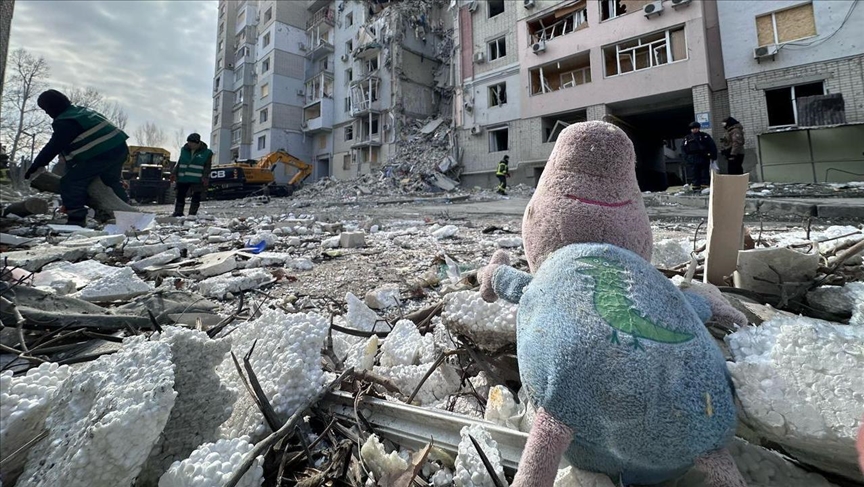Child casualties 'worsening' in Ukraine with 50% rise in 2024 compared to 2023: UNICEF
1 in 5 children in Ukraine has lost a close relative or friend since war escalated 3 years ago, says UNICEF’s chief of advocacy and communication for Ukraine
 A view of the destruction after Russian forces launched a guided aerial bomb (KAB) attack, in Kherson, Ukraine on February 19, 2025.
A view of the destruction after Russian forces launched a guided aerial bomb (KAB) attack, in Kherson, Ukraine on February 19, 2025.
GENEVA
The situation in Ukraine is worsening for children, with a 50% increase in child casualties in 2024 compared to 2023, UNICEF warned Friday, as it has been three years since the war started in February 2022.
Three years into the full-scale conflict, more than 2,520 children have been killed or injured, according to UN-verified numbers, though the real toll is likely much higher, UNICEF’s chief of advocacy and communication for Ukraine, Toby Fricker, said during a UN press briefing in Geneva.
"No place is safe," Fricker stressed, adding that schools, maternity wards, and children’s hospitals have all come under attack, with UN-verified data showing that 780 health facilities and more than 1,600 schools have been damaged or destroyed.
He said that a staggering one in five children in Ukraine has lost a close relative or friend since the war escalated three years ago, while one in three of them has reported feeling so hopeless and sad that they cannot carry out their usual activities, according to a UNICEF-led survey released Friday.
"These are the responses of more than 23,000 children who took part in the survey and are a blunt reminder of the loss and grief that pervades childhood in Ukraine," he said.
Impact on education has been 'immense'
Beyond the physical toll, the war has had a devastating impact on education. Students in Ukraine face an average learning loss of two years in some subjects, with UNICEF working to rehabilitate shelters, train teachers, and establish catch-up classes to help mitigate the crisis, according to Fricker.
"The impact on education has been immense," he said. "The impact on children's development and mental health is equally worrying."
He recalled that children in eastern Ukraine have endured nearly 11 years of conflict, sharing the story of 18-year-old Daryna, whom he first met five years ago in Zolote, an eastern mining town near the frontline.
Now displaced to Dnipro, Daryna told him: "I had plans for the future, but the war ruined everything. Now the future just doesn't exist."
During the briefing, Fricker also responded to Anadolu's question about the impact of funding cuts on UNICEF’s efforts regarding education.
He acknowledged the challenges but said UNICEF continues to provide essential support.
"We have resources that are already committed, and we continue to support the education system at a policy level, as well as on the ground, to turn around learning losses that have been present not just for three years, but since the COVID-19 pandemic and even before that," he said.
He also underlined the Ukrainian government’s strong commitment to education, emphasizing the significant budget allocations made to support learning initiatives despite the ongoing crisis.
"The government has put an extraordinary amount of budget into the education system," Fricker said. "Here in this underground school, an initiative of the authorities that UNICEF supports in different ways ... really (shows) the commitment to education is across the country."
He noted that addressing learning losses is critical for Ukraine’s future, with a focus not only on early education but also on equipping adolescents with the skills necessary for future jobs.
The crisis extends beyond Ukraine’s borders, with millions of displaced people struggling to access education. According to UNICEF, 3.7 million people remain internally displaced within Ukraine, while 6.8 million live abroad.
In neighboring host countries, half of Ukrainian school-aged children are not enrolled in national education systems, further complicating efforts to secure their future.
Anadolu Agency website contains only a portion of the news stories offered to subscribers in the AA News Broadcasting System (HAS), and in summarized form. Please contact us for subscription options.







